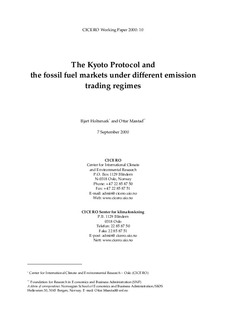| dc.contributor.author | Holtsmark, Bjart | nb_NO |
| dc.contributor.author | Mæstad, Ottar | nb_NO |
| dc.date.accessioned | 2014-03-17T14:31:30Z | |
| dc.date.available | 2014-03-17T14:31:30Z | |
| dc.date.issued | 2000 | nb_NO |
| dc.identifier.issn | 0504-452X | nb_NO |
| dc.identifier.uri | http://hdl.handle.net/11250/192394 | |
| dc.description.abstract | The consequences of the Kyoto Protocol for the fossil fuel markets depend on which policy instruments that are used in order to reach the emission targets. This paper uses a numerical model to assess the significance of international emission trading for the oil, coal and gas markets. Three different trading regimes are compared. Particular attention is devoted to the EU proposal about limits on acquisitions and transfers of emission permits. We find that the EU proposal will be non-binding for buyers of emission permits but will significantly constrain the sale of emission permits from Eastern Europe. The EU proposal will increase the level of abatement in Annex B countries and will cause a sharp increase in the price of permits compared to the free trade equilibrium. | nb_NO |
| dc.language.iso | eng | nb_NO |
| dc.publisher | CICERO Center for International Climate and Environmental Research - Oslo | nb_NO |
| dc.relation.ispartof | CICERO Working Paper | nb_NO |
| dc.relation.ispartofseries | CICERO Working Paper;2000:10 | nb_NO |
| dc.title | The Kyoto Protocol and the fossil fuel markets under different emission trading regimes | nb_NO |
| dc.type | Working paper | nb_NO |
| dc.source.pagenumber | | nb_NO |
| dc.identifier.cristin | 1728029 | |
